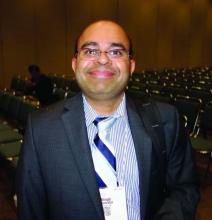LOS ANGELES –
Sulforaphane is a compound in cruciferous vegetables, especially 3-day-old broccoli sprouts. It’s sold widely online and in stores, often as broccoli sprout extract, for anticancer and other effects.
The idea of using it for autism came about after investigators noticed that, in the lab, it induced some of the cellular changes associated with fever, including upregulation of heat shock proteins, according to Kanwaljit Singh, MD, a pediatrics instructor at the University of Massachusetts, Worcester.
Fever has been reported to improve autism symptoms. So, several years ago, “we decided to do a pilot study with sulforaphane” to see if it had a similar effect, Dr. Singh said at the annual meeting of the American Academy of Neurology.
At 18 weeks, 29 young autistic men randomized to the supplement outperformed 15 randomized to placebo on the Aberrant Behavior Checklist and other measures. It was the first study of sulforaphane for autism, and it got a good deal of press attention when it was published in 2014; Dr. Singh was the lead author (Proc Natl Acad Sci U S A. 2014 Oct 28;111[43]:15550-5).
“Because we had a very good signal in our pilot study, we decided to do a slightly larger, slightly more complex clinical trial, which is ongoing right now,” he said. The results aren’t due until the second half of 2018, but he gave an interim report at the meeting.
There are 50 children with autism in the new study, aged 3-12 years. Half are randomized to sulforaphane, half to placebo, for the first 15 weeks, then all are switched to open-label sulforaphane for 15 weeks more, followed by a 6-week washout period.


